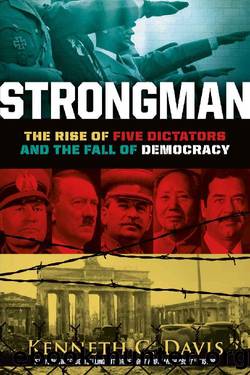Strongman by Kenneth C. Davis

Author:Kenneth C. Davis [Davis, Kenneth C.]
Language: eng
Format: epub
ISBN: 9781250205643
Publisher: Henry Holt and Co. (BYR)
Published: 2020-10-05T16:00:00+00:00
Stalin began installing Communist governments in the areas his Red Army had liberated from the Nazis, and Eastern Europe fell under the Soviet thumb. From the Kremlin in Moscow, Stalinâs henchmen ruled these captive nations with an iron fist, using every fear tactic and familiar tool of repression: secret police, neighborhood informants, state control of the media, and the eradication of individual freedoms. Democratic institutions such as courts and legislatures were replaced by a Soviet-mandated police state. All private property became state property. And always in the background was the presence of tanks ready to roll to do the regimeâs bidding.
The well-practiced Strongman technique of creating a new generation of loyal young people also had a Soviet face. The Young Pioneers, a Communist scouting group for ages nine to fifteen first organized under Lenin, grew and expanded under Stalin, their âgreat Leader and Teacher,â according to Eugene Yelchin, a Pioneer whose family later escaped the Soviet Union.
âTo arrest so many innocent people, crimes had to be invented,â Yelchin writes. âStalinâs propaganda machine deceived ordinary people into believing that countless spies and terrorists threatened their security. Tormented by fear, Soviet citizens clung to Stalin for guidance and protection, and soon his popularity reached cult status. âThe father of all Soviet childrenâ smiled and waved at his supporters during parades and celebrations, while at night, in his Kremlin office, he was signing orders for innocent people to be shot without trial.â
Among the people swallowed up by Stalinâs police state was Aleksandr Solzhenitsyn, a Red Army soldier who was sentenced to ten years in prison for writing letters to a friend that were critical of Stalin. He later described life in a Soviet labor camp in the 1962 novel One Day in the Life of Ivan Denisovich. The 1970 Nobel Prize winner also wrote The Gulag Archipelago, a 1973 work of nonfiction describing the vast system of labor prisons in which ordinary criminals and Soviet dissidentsâincluding writers, professors, and other intellectualsâwere kept in slave labor.
âIdeologyâthat is what gives evildoing its long-sought justification and gives the evildoer the necessary steadfastness and determination. That is the social theory which helps to make his acts seem good instead of bad in his own and othersâ eyes.⦠That was how the agents of the Inquisition fortified their wills: by invoking Christianity; the conquerors of foreign lands, by extolling the grandeur of their Motherland; the colonizers, by civilization; the Nazis, by race.⦠Without evildoers there would have been no Archipelago.â
Long after his death, Joseph Vissarionovich Stalin, son of a poor Georgian cobbler and his deeply religious wife, had secured a place in history as a dominant figure of the twentieth century. As with Hitler, Stalin can rightfully be called killer, monster, and fiend. But as Robert Service points out, âThe lesson to be learned from studying several of the twentieth centuryâs most murderous politicians is that it is wrong to depict them as beings wholly incomparable to ourselves. Not only is it wrong: it is also dangerous. If
Download
This site does not store any files on its server. We only index and link to content provided by other sites. Please contact the content providers to delete copyright contents if any and email us, we'll remove relevant links or contents immediately.
A Swirl of Ocean by Melissa Sarno(50933)
The Book of Dreams (Saxon Series) by Severin Tim(33339)
Cecilia; Or, Memoirs of an Heiress — Volume 1 by Fanny Burney(32509)
Cecilia; Or, Memoirs of an Heiress — Volume 2 by Fanny Burney(31920)
Cecilia; Or, Memoirs of an Heiress — Volume 3 by Fanny Burney(31904)
Call Me by Your Name by André Aciman(20449)
Eleanor and Park by Rainbow Rowell(15418)
Always and Forever, Lara Jean by Jenny Han(14857)
For the Love of Europe by Rick Steves(13690)
Norse Mythology by Gaiman Neil(13297)
Crooked Kingdom: Book 2 (Six of Crows) by Bardugo Leigh(12267)
Shadow Children #03 - Among the Betrayed by Margaret Peterson Haddix(11891)
Among the Betrayed by Margaret Peterson Haddix(11579)
Twisted Palace by Erin Watt(11123)
Six of Crows by Leigh Bardugo(10124)
They Both Die at the End by Adam Silvera(9782)
P.S. I Still Love You by Jenny Han(9551)
Fangirl by Rainbow Rowell(9193)
Thirteen Reasons Why by Jay Asher(8856)
